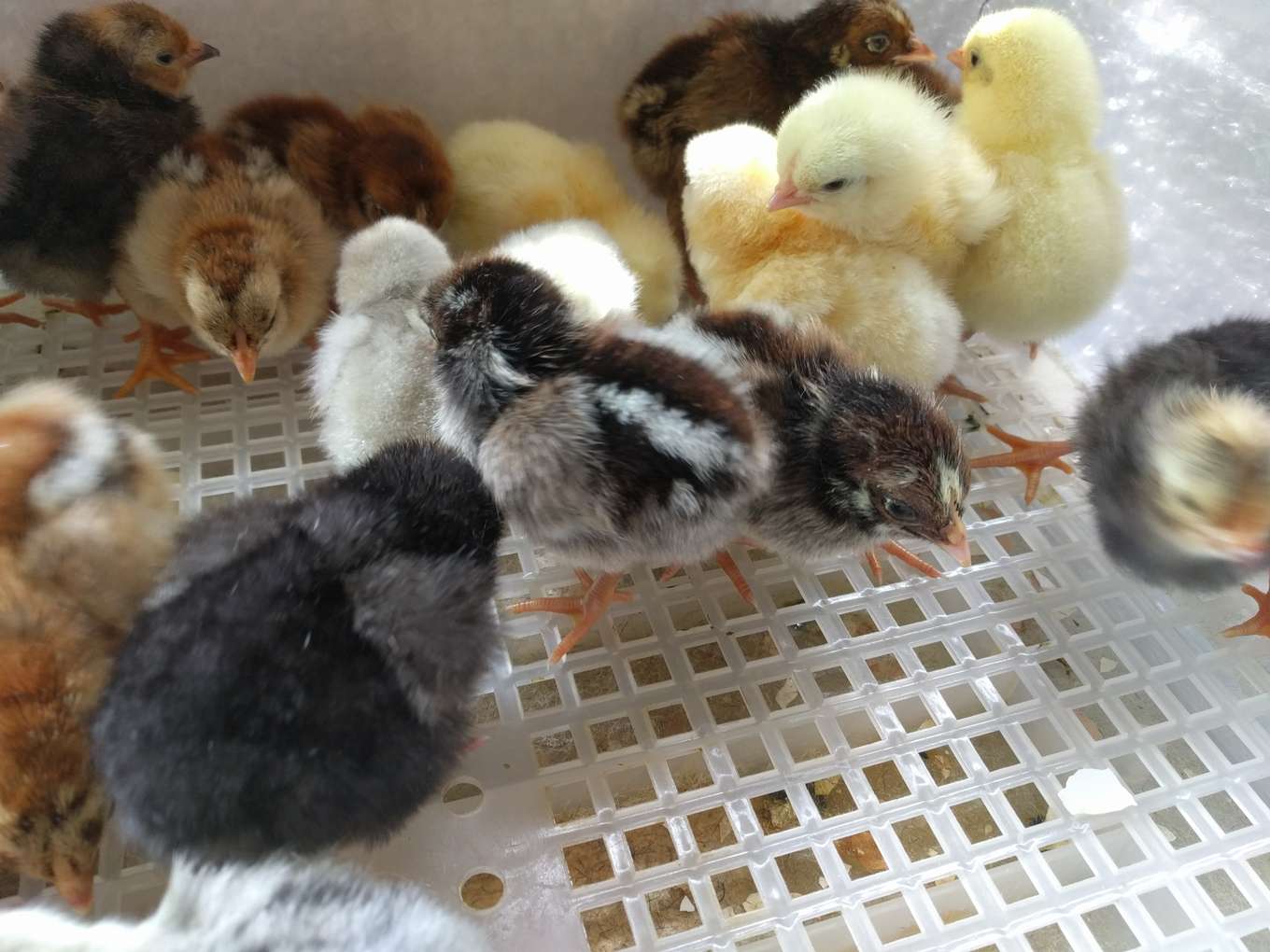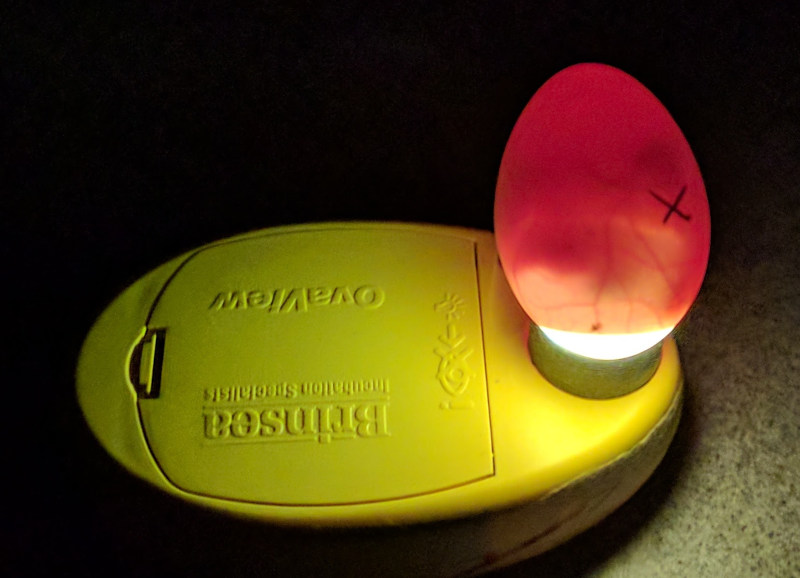What percentage of chicken eggs will hatch

What percentage of chicken eggs hatch?
How many eggs will hatch depends on many things but 70% to 90% of chicken eggs set in the incubator should hatch. There are a considerable number of factors that effect the outcome of a hatch and over the years I have every hatch rate from zero to 100%.
In highly optimised environments like commercial hatcheries that figure is often higher than 95%, this is because they select their hens and cockerels for fertility and feed them special rations.
Below: An incubator full of day old chicks.
Some eggs just don't develop, and some chicks will not make it all the way to hatch, and a few will die soon after hatch for various reasons.
What is the success rate of hatching eggs?
The success rate of hatching eggs is measure of the number of chicks that hatch successfully from a number of eggs in the incubator. It is expressed as a percentage of eggs that hatch from the number set.
My average for last season was an 81% hatch rate, that means that for every 100 eggs I put in the incubator, I got 81 chicks. It did vary with the breed and the season.
Some people include clear or infertile eggs in the hatch rate and some remover clear eggs before calculating the rates. That is why I have given a range of vales in my answers.
What is a poor hatch rate?
Anything less than 55% hatch is a poor hatch rate. Although if you are hatching Cornish hens you would probably be delighted with a 55% success rate so all things are relative.
What is an average hatch rate?
Between 55% and 75% of egg hatching is an average hatch rate.
Many chickens keepers are understandably eager to get breeding when they have an established flock of their chosen variety
What is a good hatch rate?
Anything over 75% is a good hatch rate.
What is the difference between fertility rate and hatch rate?
Fertility rate is the number of eggs that are fertile in any given batch. As an example, the last batch of eggs I set has 4 clears at 10 days. As that incubator takes 77 eggs so my fertility rate is 94.8%.
Fertility rate is the number of eggs that don't start to develop as a percentage of the hatch and hatch rate is the number of eggs that don't hatch. The hatch rate should include the eggs that have blood rings and are dead in shell as these were fertile but died during incubation.
The hatch rate should include all eggs that didn't hatch regardless of when they were removed from the incubator.
If you are having fertility problems with your chickens then this article may help.
How do you calculate fertility and hatch rate percentages?
The formula for calculating fertility rate is:
((Number of eggs set - number of infertile eggs) / Divided by the number of eggs set) and multiplied by 100 to give a percentage.
If we insert the figures from my last hatch that will give us:
((77-4)/77)*100 = 94.8%
The formula for calculating the hatch rate is:
((Number of eggs set - all eggs that did not hatch [inc not fertile]) / divided by number of eggs set) and multiplied by 100 to give a percentage.
If I use the figures again from my last hatch:
((77-13)/77)*100 = 83.1% hatch rate.
Do hens have better hatch rate than incubators?
It depends, I have found my hens have consistently produces about a 10% better hatch rate than I do with my incubators.
The hens I have noticed seem to have a sixth sense about which are bad and tend to tip them out of the nest. I have come to have a look at my broodies and regularly seen and egg or two rolled out of the nest and the hens are always spot on about which eggs won't develop properly.
On the other hand some hens are just terrible mothers and hardly ever seem to hatch anything.
What factors effect hatch rates?
For a small backyard flock keeper with a small incubator, just some of the factors that influence hatch percentage include:
- Whether the eggs have been posted or shipped.
- The breed of chicken. Some types like the Cornish struggle to mate properly.
- Lethal genes like the creeper gene in Japanese bantams.
- The nutritional state of the parents.
- The age of the chickens that laid or fertilised the eggs.
- Fertility of individual birds in the flock.
- Brand and quality of your incubator. Yes, this really does matter.
- Cleanliness of the eggs and incubator. Eggs covered in poop are more likely to get infected.
- The time of year. Fertility is highest in the spring.
- Age of eggs you are setting in the incubator. Old eggs fail more often.
- Temperature stability.
- Air movement and oxygen supply in the incubator.
- Correct and stable humidity.
- Not opening the incubator and fiddling with the eggs too often.
- Whether the eggs are properly turned, either by hand or automatically.
- Diseases. Some conditions don’t affect the grown chickens but kill chicks in the shell.
What happens if chicken eggs don't hatch in 21 days?
Hens get off their nests and leave any eggs that haven't hatched to die. This rather brutal action keeps the incubation period of chicken eggs to 21 days and means that all the chicks in the clutch get the same start in life with no younger weaker ones in the group.
Incubation periods are heredity and if you consistently allow long period chicks to hatch you could well end up with hatched that are either spread out over a number of days or happens much later.
Low incubation temperature can also cause long incubation periods so again accurate equipment is a must.
Expert tips for improving hatch rates while incubating chicken eggs:
A few tips to help you get the best results from your hatching.
- Plan your hatch and keep records and dates.
- Select your hatching eggs properly.
- Store your hatching eggs in the correct way.
- Set an alarm on your phone so you know when to turn the egg roller off
- Reduce the number of hens per cockerel.
- Buy an accurate thermometer to check your incubators.
- Don't fiddle with the temperature and humidity setting once eggs are set.
- Consistency is better than extreme accuracy.
How do you tell if an egg is going to hatch?
There is no way to tell just by looking at the egg.
Below: Candling an egg is the best way to get an idea of whether the egg is going to hatch.

It is not a guarantee that a fertile egg will hatch, other factors need to be taken into consideration.
